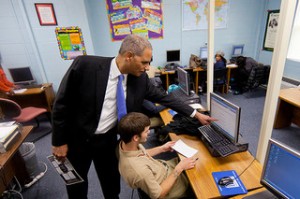
Ask Mitt Romey and Barack Obama about the lingering high unemployment rate and they’ll likely cite a “skills mismatch” between American workers and available jobs as at least one part of the problem. Despite this striking point of agreement across the political spectrum, Barbara Kiviat argues in The Atlantic that social science data tell a different, much murkier, story.
Consensus over whether U.S. workers have the skills to meet employer demand has see-sawed over time.
That public discourse in the 1980s landed on the idea of a vastly under-skilled labor force is curious, considering that less than a decade earlier, policymakers believed that over-qualification was the main threat as technology “deskilled” work. In the 1976 book The Overeducated American, economist Richard Freeman held that the then-falling wage difference between high-school and college graduates was the result of a college-graduate glut. Sociologists studying “credentialism” agreed, arguing that inflated hiring requirements had led U.S. workers to obtain more education than was necessary. A 1973 report by the Department of Health, Education and Welfare ruminated about how to keep employees happy when job complexity increasingly lagged workers’ abilities and expectations for challenging jobs.
This simple story of a “skills mismatch,” regardless of whether workers are over- or under-qualified, is not universally supported by data, depending on how you slice it. When looking at individual-level data, Kiviat notes:
The findings here are decidedly more nuanced. While certain pockets of workers, such as high-school drop-outs, clearly lack necessary skill, no nation-wide mismatch emerges. In fact, some work, such as an analysis by Duke University’s Stephen Vaisey, finds that over-qualification is much more common than under-qualification, particularly among younger workers and those with college degrees.
It seems that the heart of the matter really comes down to what story you want to tell about what kind of workers with what kind of skills, a much less neat and tidy task than painting a broad-stroked mismatch picture.
As sociologist Michael Handel points out in his book Worker Skills and Job Requirements, in the skills mismatch debate, it is often not clear who is missing what skill. The term is used to talk about technical manufacturing know-how, doctoral-grade engineering talent, high-school level knowledge of reading and math, interpersonal smoothness, facility with personal computers, college credentials, problem-solving ability, and more. Depending on the conversation, the problem lies with high-school graduates, high-school drop-outs, college graduates without the right majors, college graduates without the right experience, new entrants to the labor force, older workers, or younger workers. Since the problem is hazily defined, people with vastly different agendas are able to get in on the conversation–and the solution


